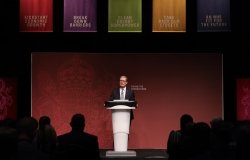Smart Take | Bomb Blasts in Pakistan Kill Scores Ahead of Thursday Election
Two blasts in Pakistan have killed 27 people on the eve of Parliamentary elections in Pakistan. While elections will proceed as planned, the attacks have created an atmosphere of fear and instability ahead of the vote. Michael Kugelman, Director of the South Asia Institute, comments on the likely outcome of the election, Pakistan’s history of political violence, and the strong influence of the military in the transition of power.
Video Transcript
Bomb Blasts in Pakistan Kill Scores Ahead of Thursday Election
This transcript has been lightly edited for clarity.
Unfortunately, you know, the the blasts that we saw today are just the latest example of how Pakistan tends to be hit by election related violence. And in the weeks and especially the days leading up to elections themselves. If you go back the last few elections, 2018 and especially 2013, there were many terrorist attacks related to the election. In fact, more than there have been this year in this election cycle.
I think it's a reminder of the security threats that Pakistan faces. It faces a resurgence of terrorism led by groups like the Pakistani Taliban as well as the the South Asia affiliate of Islamic States. And then there also is political violence where you have, you know, disputes between different political parties and factions that play out violently. The big storyline going into this election is that we've seen Khan and his party suffer from significant levels of repression. There have been major crackdowns in recent months that have put Khan in jail as well as a number of other senior leaders of the party. Large numbers of supporters of the party have been put in jail. And the way things work in Pakistan is that the military is very powerful. That's another key player here. And what we tend to see in the political history of Pakistan is in the weeks and months leading up to elections, the party that happens not to be in the good graces of the military suffers from these from these crackdowns.
That said, I would argue that the most likely outcome of the election is for Sharif's party, the PMLN, to lead the next government. And that is a party that has been in control of Pakistan's government on a number of occasions in recent years. Nawaz Sharif himself has been prime minister three times before, and so he's a known entity for Washington, for Beijing, for Riyadh, for other countries in the West as well. And I think they would be comfortable working with him.
Guest

Hosted By

Indo-Pacific Program
The Indo-Pacific Program promotes policy debate and intellectual discussions on US interests in the Asia-Pacific as well as political, economic, security, and social issues relating to the world’s most populous and economically dynamic region. Read more












